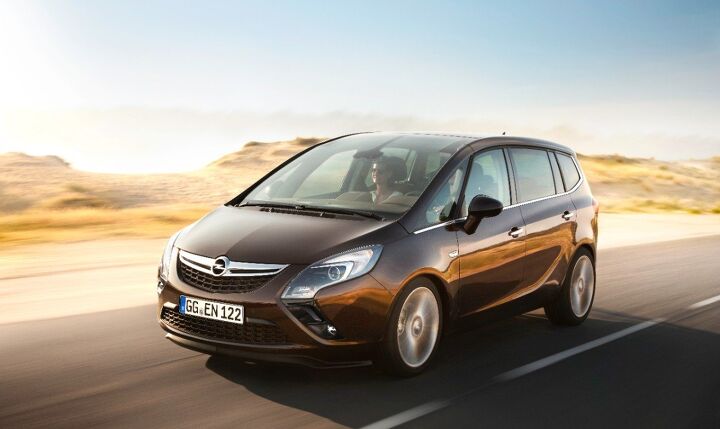Is GM Europe About to Be Swallowed by the Dieselgate Maelstrom?

Rumors have swirled for months that Opel would be implicated in the dieselgate scandal. Over the weekend, serious allegations took flight that Opel does in fact use defeat devices in two diesel models.
Opel has been summoned to appear in front of the German Transport Ministry investigative committee this week to answer claims that its cars are capable of skirting emissions laws.
Der Spiegel reported last week the Opel Astra was found to contain software that will deactivate emissions control systems when the outside temperature is either below 20 degrees Celsius (68 degrees Fahrenheit) or above 30 degrees Celsius (86 degrees Fahrenheit). Additionally, it discovered the emissions systems do not work when engine speed exceed 2,400 rpm, the car is moving faster than 145 km/h, or ambient air pressure is less than 915 millibar, which would indicate an elevation of more than 850 meters.
Spiegel claims it detected the software by investigating the specific motor controls, as well as observed discrepancies, between the lab tests at TUV Nord in Essen and on-road testing.
The 1.6-liter diesel in question was by GM, used throughout the European lineup, and is slated for North American launch later this year in the new Cruze.
Opel is playing a game of semantics here; its official response being we do not use software “which determines whether a car is subjected to an emissions test.” However, the effect is ultimately the same, with exhaust treatment only operating within a small window of variables.
Meanwhile, in the Netherlands, RDW, the Dutch authority that issued EU type approval for the Opel Zafira Diesel, is considering a recall and a possible — but unlikely — withdrawal of approval.
Where the situation gets muddy is when you look at EU type approvals.
The rules state “the use of defeat devices that reduce the effectiveness of emission control systems shall be prohibited.” At the same time, those rules also state the prohibition shall not apply “when the need for the device is justified in terms of protecting the engine against damage or accident and for safe operation of the vehicle.”
Effectively, automakers can drive a bus through a loophole as large as that simply by stating an engine could be damaged while operating in certain ambient temperatures with the emissions controls operating.
Unfortunately, until regulations are tightened up, the manufacturers will continue to exploit those loopholes.
The industry is operating under the old adage “if you ain’t cheatin’, you ain’t trying.” If one automaker refuses, another won’t, handing them a competitive advantage.
Call it the Lance Armstrong defense.

More by Michael Accardi
Latest Car Reviews
Read moreLatest Product Reviews
Read moreRecent Comments
- SCE to AUX All that lift makes for an easy rollover of your $70k truck.
- SCE to AUX My son cross-shopped the RAV4 and Model Y, then bought the Y. To their surprise, they hated the RAV4.
- SCE to AUX I'm already driving the cheap EV (19 Ioniq EV).$30k MSRP in late 2018, $23k after subsidy at lease (no tax hassle)$549/year insurance$40 in electricity to drive 1000 miles/month66k miles, no range lossAffordable 16" tiresVirtually no maintenance expensesHyundai (for example) has dramatically cut prices on their EVs, so you can get a 361-mile Ioniq 6 in the high 30s right now.But ask me if I'd go to the Subaru brand if one was affordable, and the answer is no.
- David Murilee Martin, These Toyota Vans were absolute garbage. As the labor even basic service cost 400% as much as servicing a VW Vanagon or American minivan. A skilled Toyota tech would take about 2.5 hours just to change the air cleaner. Also they also broke often, as they overheated and warped the engine and boiled the automatic transmission...
- Marcr My wife and I mostly work from home (or use public transit), the kid is grown, and we no longer do road trips of more than 150 miles or so. Our one car mostly gets used for local errands and the occasional airport pickup. The first non-Tesla, non-Mini, non-Fiat, non-Kia/Hyundai, non-GM (I do have my biases) small fun-to-drive hatchback EV with 200+ mile range, instrument display behind the wheel where it belongs and actual knobs for oft-used functions for under $35K will get our money. What we really want is a proper 21st century equivalent of the original Honda Civic. The Volvo EX30 is close and may end up being the compromise choice.


































Comments
Join the conversation
Well, it seems the good name of General Motors isn't so perfect either. I wonder who else will be caught out. I really do think emissions standards should be the same globally. From some of the comments I read it appears some don't realise that most or all industries and businesses have skeletons in the closet. I wonder if the initial Colorado diesel release was held up because of this software??
As I've said before, the real idiocy is tests that are so gameable, gaming them is the only game in town. It's like trying to asses how much each student learned in an advanced calculus class, by providing them with the one single question that will be on the final, in the first lecture. Then be amazed at how good they all must be at calculus. While patting yourself on the back, for being such an obviously great professor. Back in the real world, the tests, and protocols, were/are designed in consultation with "industry experts." Meaning, they are a marketing tool. Intended to make people feel better about buying the products European manufacturers have the biggest competitive advantage over foreign rivals at building.